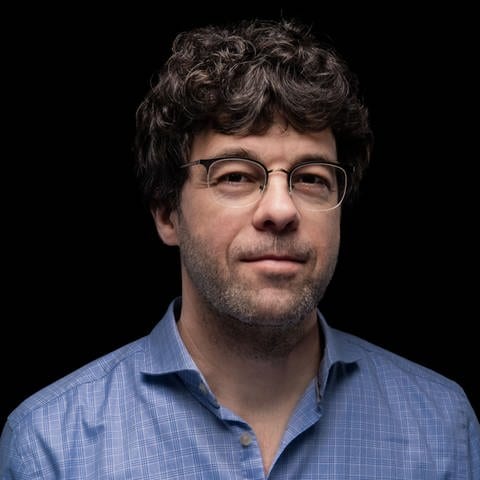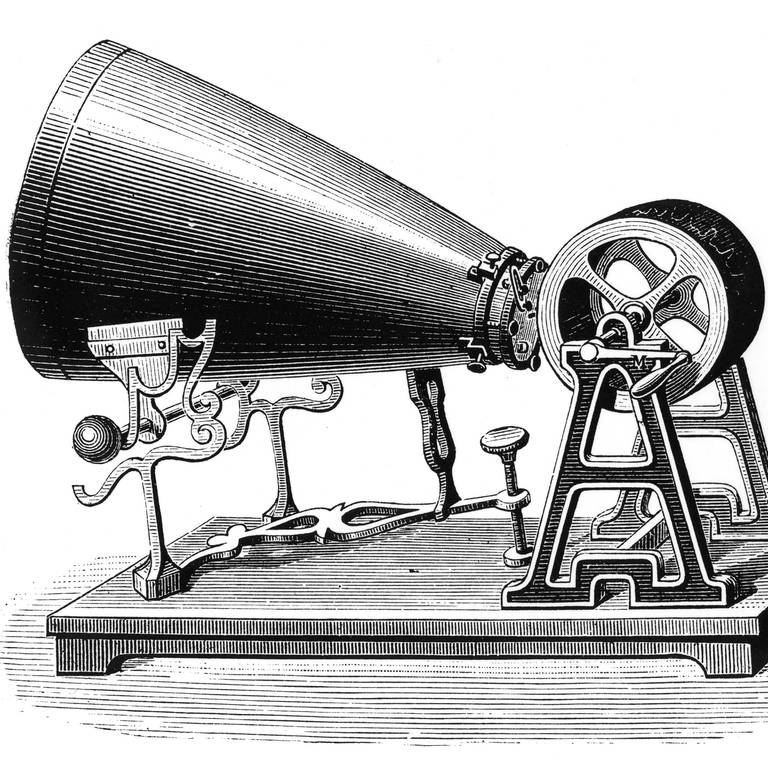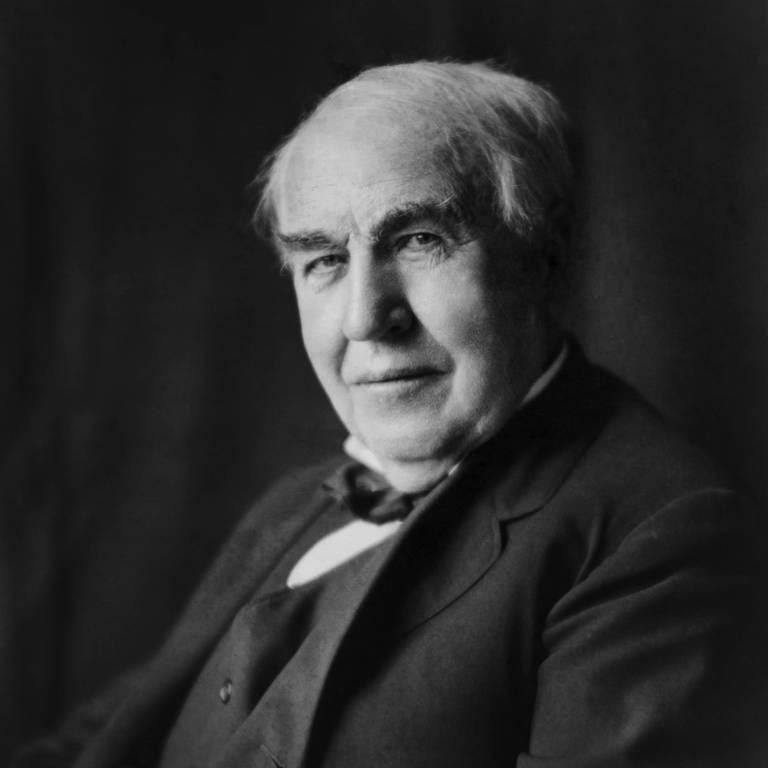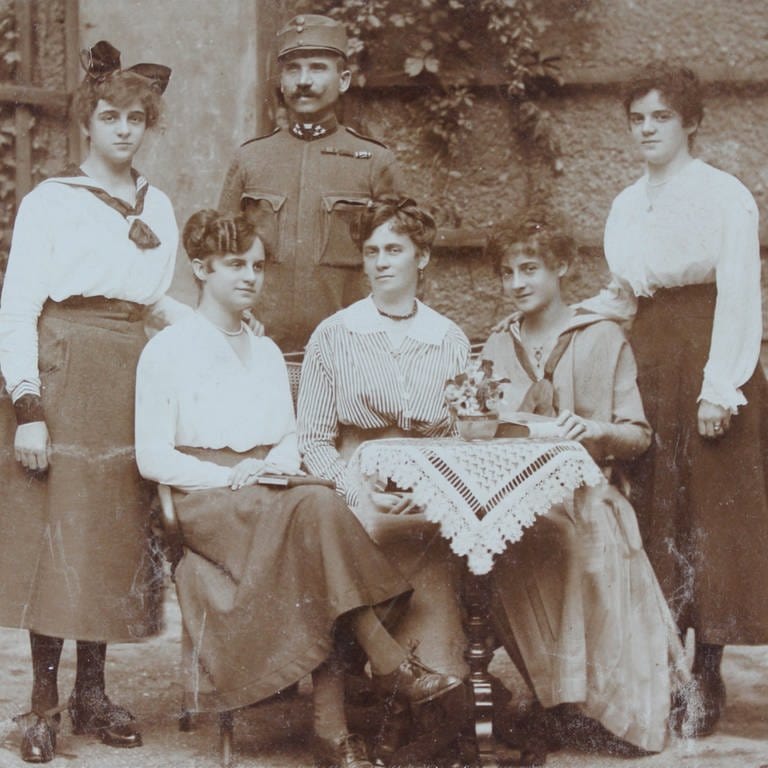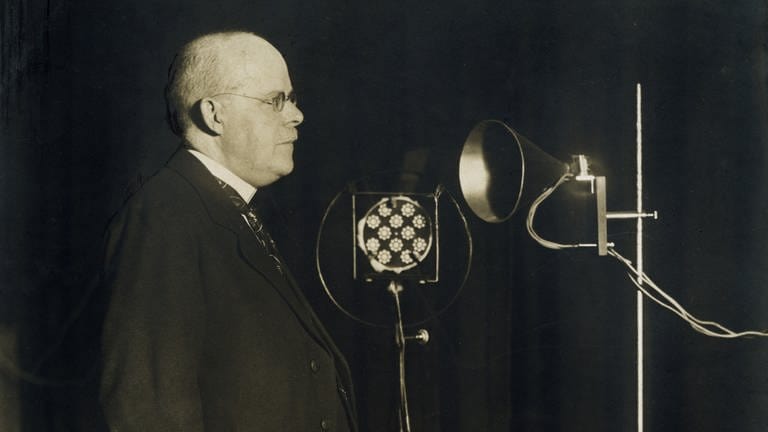Als Thomas Edison am 18. Juli 1877 den ersten Phonographen erfand, ging es ihm noch nicht um Aufnahmen für die Ewigkeit, sondern primär um das Festhalten und Wiedergeben von Sprachnachrichten, etwa aus einem Telefon – eine Erfindung, die noch ganz jung und Edison natürlich vertraut war.
Rekonstruiert: Edisons Phonograph zeichnet 1878 Kindergedicht auf
Bei seinem ersten geglückten Versuch mit dem Phonographen nahm Edison ein Kindergedicht auf: "Mary had a little lamb" – Mary hatte ein kleines Lamm.
Mary had a little lamb,
Its fleece was white as snow, yeah.
Everywhere the child went,
The little lamb was sure to go, yeah.
Der Phonograph bestand aus einer Zylinder-Walze, die mit einer Zinnfolie überzogen war. Edison sprach in einen Trichter, die Ton-Schwingungen übertrugen sich über eine Membran auf eine Nadel und von der Nadel wiederum auf die sich drehende Walze. Diese erste Aufnahme ist allerdings nicht erhalten, denn das Zinn nutzte sich beim mehrmaligen Abspielen schnell ab.
Im Folgejahr 1878 präsentierte Edison seine Erfindung bei verschiedenen Gelegenheiten. Davon sind Zinnfolien erhalten, die sich lange nicht mehr abspielen ließen. Doch es gibt eine Zinnfolie aus dieser Zeit, bei der es Forschern aus Kalifornien 2012 gelang, einen Teil der Folie optisch abzutasten, daraus ein 3D-Bild der Rinnen zu erstellen und mithilfe eines Computers daraus den Ton zu rekonstruieren. Heraus kam: Mary had a little lamb.
Der Sprecher ist in diesem Fall nicht Thomas Edison, sondern vermutlich ein Journalist namens Thomas Mason.
1888: älteste in der ursprünglichen Form erhaltene Sprachaufnahme
Aus dem Juni 1888 wiederum stammt eine Aufnahme, auf der Edison selbst zu hören ist. Ein Jahr zuvor hatte er nämlich das Zinn durch Wachs ersetzt, was deutlich länger hielt. Dies ist also die älteste Sprachaufnahme, die in der ursprünglichen Form erhalten ist. Edison diktiert eine fiktive Sprachnachricht an einen gewissen Mr. Blaine und zählt darin die Etappen einer Weltreise auf.
"Uh, now, Mr. Blaine, as you've been nearly around the world, I'll take you 'round the world on the phonograph. I'll not charge you anything. I'll take you on a steamer, eh, a Cunard steamer to Liverpool, and from Liverpool to London, from London on the London and Brighton Railroad to Brighton, and from Brighton we'll go on those little two-cent steamers across the English Channel to Calais. And from Calais we'll go on the chemin du fer du nord .
I can't give you the exact Parisian pronunciation of this railroad, but I guess you'll understand it. We'll get into Paris and make for the, uh, Grand Hotel. And then in the morning we'll go to our bankers and get you some money on our letters of credit. And then we'll go and stay around Paris for about two weeks and go to Berlin. After we've stayed about two, three days in Berlin and got the blues, why, we'll go to St. Petersburg. And St. Petersburg we'll go to Moscow, and from Moscow back by the same route to Berlin. And from Berlin we'll go to Vienna and from Vienna to Budapest to see the Hungarians.
And then most people would go to Monte Carlo. But we'll not go to Monte Carlo, we'll go to Munich, or München. I believe they call it München. But that's not a very nice name to me. I like to call it Munich. Well, then from Munich we'll go to Milan. Milan we'll go to Rome. Rome we'll go across the Mediterranean Sea.
I don't know but what I'm a little out of my geography, we'll go to Alexandria. Alexandria through the Suez Canal to the Red Sea, into the Bay of Bengal. And then to Bombay. Bombay we'll probably get the cholera, and stay at the hospital two, three months and have lots of fun. And then we'll go to Calcutta, Calcutta to Singapore on the Malay archipelago. And then to Hong Kong [Husten]. Hong Kong to Tokyo, Tokyo on a Pacific Mail Steamship Company to San Francisco, San Francisco to Ogden, Ogden to Laramie, Laramie to Cheyenne, Cheyenne to Omaha, Omaha to Chicago, Chicago through Pittsburgh, Harrisburg, Philadelphia, New York.
Now, Mr. Blaine. won't you say a few words on another cylinder so my young man can bring it over to the laboratory. I want to put it through a process to get several hundred duplicate cylinders so other peopl e can hear what you say. Uh, goodbye, Edison."
9.4.1860 Ältestes Tondokument der Menschheit: "Au claire de la lune"
9.4.1860 | Thomas Alva Edison war zwar der erste Erfinder, der 1877 bewusst menschliche Sprache aufgenommen hat, um sie hinterher wiederzugeben – und zwar mithilfe des von ihm erfundenen Phonographen.
Doch 2008 wurde ein 17 Jahre älteres Tondokument rekonstruiert. Es geht auf den Pariser Drucker und Buchhändler Édouard-Léon Scott de Martinville zurück. Er hat 1857 ebenfalls ein Gerät gefunden, das er Phonautograph nennt. Sein Ziel war es gar nicht, Sprache aufzunehmen, um sie wiederzugeben. Er wollte lediglich Klang visuell aufzeichnen.
Dazu benutzte er rußgeschwärztes Papier, das auf eine Walze montiert war. Er sprach in einen Schalltrichter mit einer Membran am Ende. Die Schwingungen der Membran übertrugen sich auf eine Schweinsborste, die wiederum Linien in den Papierruß kratzte.
2.1.1919 Thomas Alva Edison über den Ersten Weltkrieg
2.1.1919 | Patriotisches Grußwort von Thomas Alva Edison: "Wir sind stolz auf die Nordamerikaner, die ihr Leben für die Freiheit der Welt riskiert haben. Wir dürfen aber die Bedeutung unserer Alliierten nicht vergessen. Ohne die Belgier, Briten, Franzosen und Italiener hätte der Krieg nicht gewonnen werden können."
3.8.1914 Ein Soldat nimmt Abschied von seiner Familie
3.8.1914 | Der Soldat heißt Alfons Baffre, er kommt aus Wien. Er muss gleich in der ersten Kriegswoche in den Landsturm einrücken und hinterlässt seinen Angehörigen einen Abschiedsgruß auf einer Wachswalze. Diese ist stark beschädigt, die Aufnahme daher schwer verständlich. Er richtet sich an seine „lieben Kinder“ und sein „liebes Weiberl“. Er bittet seine Frau, auf Gott zu vertrauen und auf ihre Gesundheit zu achten. Alles andere „wird dann recht werden“.
